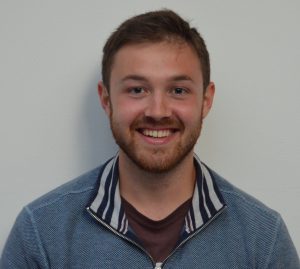Owen Peckham MEng

Owen has just completed the second year of his PhD focussed upon developing new methodologies for Generative Design (GD). More specifically, Owen’s research aims to create algorithms and processes that facilitate the generation of hollow structures, which are in many cases lighter for the same strength. Owen is supervised by Mark Goudswaard and Ben Hicks.
Prior to beginning his postgraduate studies with the DMF lab, Owen received an MEng from the University of Bristol in Mechanical and Electrical Engineering. In the pursuit of his undergraduate degree Owen conducted research projects that investigated automated controller tuning for DC electronic converters and the viability of a novel braille e-reader device he designed. Over the summers throughout his degree Owen completed both industrial and academic internships, designing an ANPR system for road-side gas analysers and exploring the role of information sharing in the performance of agent-based distributed Additive Manufacturing (AM) networks (read more here).
1st Year
In the first year of his PhD Owen honed in on his research topic through a series of studies (some of which are ongoing):
- An investigation into the design process and creativity contributions made by existing GD tools and packages. This work showed the domains that GD tools currently inhabit whilst highlighting opportunities and limitations of current computational design methods.
- Exploration into the variability of outcome performance of GD components realised with AM, displaying the challenges related to producing the often complex ouputs from computational design tools.
- A systematic literature review into the contributions of AI in GD as represented in academic literature, demonstrating the need for lightweighting across multiple engineering applications.
- Characterisation of the relative strength-to-weight ratios of solid and hollowed structures, validating the hypothesis that the hollow components perform better.
- Development of a novel method of beam/ strut cross-section optimisation.
Tangential (but often very closely related) to the main work of his PhD, Owen has also worked on several other projects:
- A collaboration with Didunoluwa Obilanade, a visiting researcher from Sweden’s Lulea University of Technology, looking at the use of design artefacts to better understand the considerations necessary when designing for AM.
- Work toward determining the affects of multiple manufacturing constraints upon the performance of components synthesised using GD.
- Further development of previous work done at the University of Bristol into the development of AM-derived low cost microfluidics.
2nd Year
Through the second year of his PhD Owen dug deeper into existing methodologies to determine the reason behind their limitations. Having determined the causes, he then explored four alternative methods that may enable circumvention of the traditional hole nucleation limitations. After assessing these new methods for robustness, convergence speed and computational cost, Owen settled on a Piecewise-Constant Level Set approach to structural optimisation as most promising for the purposes of hollow structural optimisation.
In addition to his work creating a hollow-capable structural optimisation toolchain, Owen has also made progress in demonstrating the advantages of hollow structures through FEA and physical testing of PLA FDM structures, with preliminary results indicating that hollowing can increase stiffness by up to 2.5x. This work is accepted for publication by the International Conference of Engineering Design and will be presented in Dallas, Texas in August 2025.
Alongside his PhD from August 2024 to March 2025 Owen also worked alongside Oliver Schiffmann as a research engineer on an extension of the low-cost microfluidics project. This work saw Owen updating and upgrade the existing Autodesk Fusion channel design tool, invent several optimisations for the microfluidic manufacturing process, and travel to Thailand to deliver a workshop about the use and manufacture of microfluidic devices and the Chulabhorn research institute.
Finally, Owen has completed a structured literature review that explores the uses of AI in GD, which has been published in the journal ‘Designs’. The review explores the trends and opportunities within the field, in particular highlighting the need for models that operate with engineering-format data at their core. Read the paper here.
Future Work
Over the coming year Owen aims to develop his work along two principal avenues. First, the continued development of a hollow-capable structural optimisation toolchain. Alongside the optimiser, this requires use of sophisticated numerical analysis methods that can reliably evaluate complex geometries with large length scale ranges. Second, further evaluation of the real-world feasibility of hollow structures. For this Owen plans to run a comparison study across 3 standard academic benchmarks to thoroughly determine the usefulness of the approach.
Owen is also proud to announce that he is currently looking forward to being hosted by Professor Cagan and his team at Carnegie Mellon from September to December 2025. The collaboration aims to grow stronger ties between Bristol and Cargnegie Mellon whilst combining expertise to develop effective new technologies.
Publication Links
- Artificial Intelligence in Generative Design: A Structured Review of Trends and Opportunities in Techniques and Applications
- Investigating and Characterizing the Systemic Variability When Using Generative Design for Additive Manufacturing
- Stress concentrations and design for additive manufacturing: a design artefact approach to investigation
- Are generative design tools creative? A characterisation of tools throughout the design process
- What to Share? A Preliminary Investigation into the Impact of Information Sharing on Distributed Decentralised Agent-Based Additive Manufacturing Networks
- Examining the trade-offs in generating designs for many manufacture
Last updated: 30/06/2025
If you’re interested in any of Owen’s work, please get in touch.
Email: owen.peckham@bristol.ac.uk
LinkedIn: Owen Peckham
